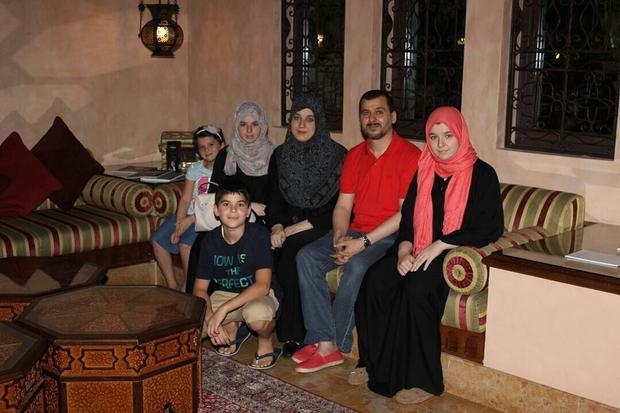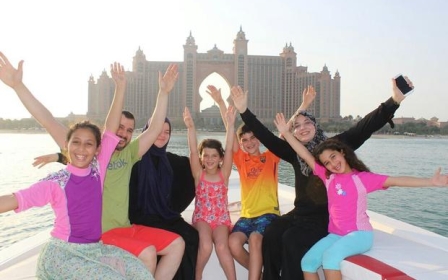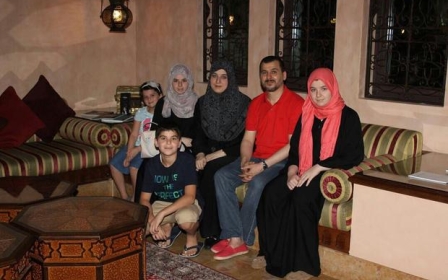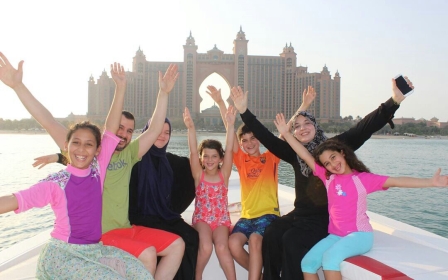Libyan-Canadian acquitted in UAE, but taken back to prison, family says

TORONTO, Canada – Libyan-Canadian businessman Salim Alaradi has been acquitted of all charges by a United Arab Emirates court, his family said.
But Alaradi was taken back to prison following Monday’s verdict, prompting concerns among his family and legal team, who are calling for his immediate release and access to medical treatment.
“I can’t even explain my emotions right now, they’re all over the place. We are so happy. As I’ve been saying, my father is innocent … and now the courts have said that my father is innocent,” said Alaradi’s eldest daughter, Marwa, who has been leading an international campaign for his release.
“I’m trying to stay focused and know that it’s not over yet. My father is not free, and we need to get him out as soon as possible today,” she told Middle East Eye in a telephone interview Monday.
Alaradi has been detained in the UAE for nearly two years after state security agents arrested him from a Dubai hotel room in August 2014 while on vacation with his family.
He was accused of providing financial support for and cooperating with Libya-based groups Libya Dawn and the February 17 Brigade, and was among a group of Libyan nationals arrested around the same time in the UAE for similar offences.
Alaradi was originally charged with terrorism-related offences, but those were dropped in March and lessened to collecting donations without permission from the proper Emirati ministry and sending supplies without the approval of the UAE government.
Alaradi, who pleaded not guilty earlier this year, was tried alongside a father and son, Libyan-Americans Kamal and Mohamed Eldarat, who were also acquitted of the charges against them on Monday.
“We’re crying from joy and happiness that this horrible chapter of our lives is almost at an end,” Marwa told MEE.
Detained for over 640 days
Libyan-born Alaradi immigrated to Canada from the UAE in 1998, according to the Canadian Press, and returned to the UAE in 2007 to run a home-appliance business. His wife and five children live in Windsor, Ontario.
Since the case began, legal and human rights experts have criticised the treatment Alaradi and his co-accused received in detention and a lack of due process in their case.
In an open letter dated 27 May, a group of international lawyers, including experts in Canada, the US and UK, Libya, Morocco and Sierra Leone, stated that the men were denied fair trials, including the right to be charged and tried promptly.
The United Nations’ Special Rapporteur on Torture, Juan Mendez, also said that he received evidence the men were tortured and forced to sign confessions, and held incommunicado in secret detention facilities and in solitary confinement.
“International law, including the Convention against Torture ratified by the UAE, clearly prohibits the use of any evidence obtained under torture during a trial,” a group of UN experts said.
Alaradi’s Canadian lawyer, Paul Champ, told Middle East Eye that he was concerned UAE state security may still have some influence over the case.
“Mr. Alaradi was, as you may recall, held incommunicado in secret by state security for the first three months of his detention where he indicates that he was brutally tortured during that time,” Champ told Middle East Eye.
He said Canadian diplomatic officials inside the courtroom told him that Alaradi and his co-accused cheered and hugged each other when the verdicts were read out, “but before they could speak with their defence lawyers, guards whisked them away.”
“He has been found to be innocent by a court,” Champ said, “and really there should be no reason why he shouldn’t be on a plane being reunited with his family as soon as possible”.
Canada’s response
In a statement, Canada’s Minister of Foreign Affairs Stephane Dion said he welcomed Alaradi’s acquittal on Monday.
The department said Canadian officials are providing Alaradi with consular services and will help facilitate his return home. “We expect an expedited process to promptly reunite him with his family and friends,” the statement read.
“We are moved by the resiliency shown by Mr. Alaradi’s family, in particular, their courage and conviction,” the statement continued.
Last week, before the verdict was released, Global Affairs Canada told MEE in an email that it has raised the case with UAE officials, including voicing concerns about Alaradi’s health and consular access.
Spokesperson Rachna Mishra added that Canada’s ambassador to the UAE, Arif Lalani, and other senior Canadian officials have attended every hearing in the case.
Champ said Canadian officials indicated after the verdict that they had already been in communication with their counterparts in the UAE’s ministry of foreign affairs. There is hope that Alaradi’s continued detention is due to administrative reasons, he said.
“Obviously we want to remain vigilant,” Champ said.
“This has been a very sensitive case right from the beginning and we are going to continue to work with Canadian diplomatic officials to ensure that Salim is released and ultimately on a plane out of the country.”
Urgent medical care
Meanwhile, Marwa Alaradi said her father is in dire need of medical treatment.
He is suffering from a range of health problems, including asthma, heart problems, and a kidney stone that formed after being forced to drink unclean water in prison. “My father is suffering from a lot of issues in his health and he needs to get checked out as soon as possible,” Marwa said.
She said the family has arranged for a doctor to examine him in Istanbul after his release, and the family plans to meet him there.
She said she is hopeful that she will be reunited with her father very soon – but she knows that the fight is not fully over.
“We’re going to see our father again and that is what I’ve been working for, for a very long time and asking the world to help us get our father back,” she said. “Finally it’s here and my father’s innocent, [but] we need to get him out of prison.”
Middle East Eye propose une couverture et une analyse indépendantes et incomparables du Moyen-Orient, de l’Afrique du Nord et d’autres régions du monde. Pour en savoir plus sur la reprise de ce contenu et les frais qui s’appliquent, veuillez remplir ce formulaire [en anglais]. Pour en savoir plus sur MEE, cliquez ici [en anglais].




